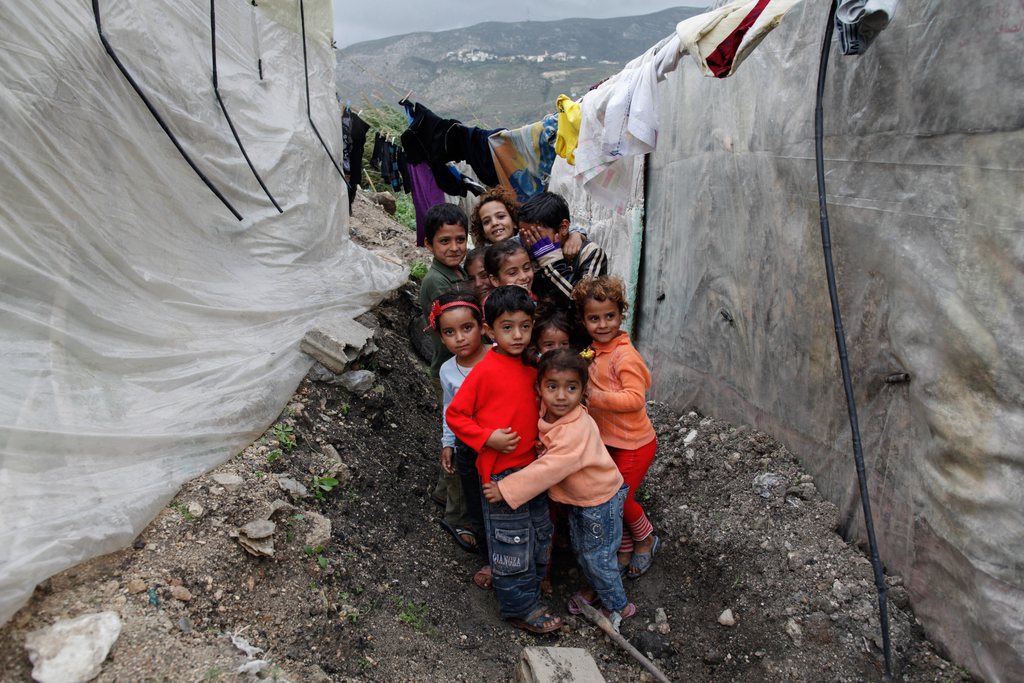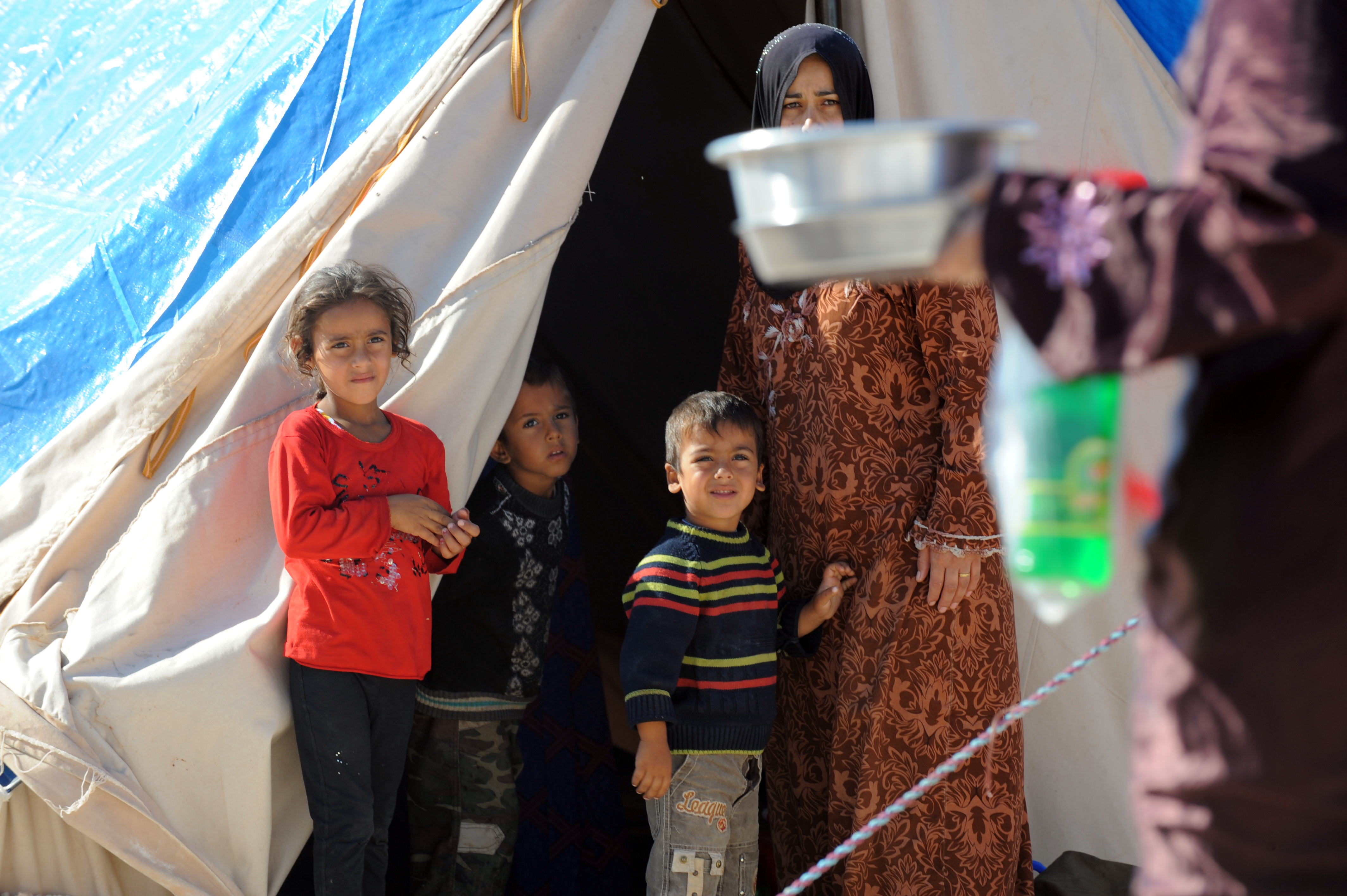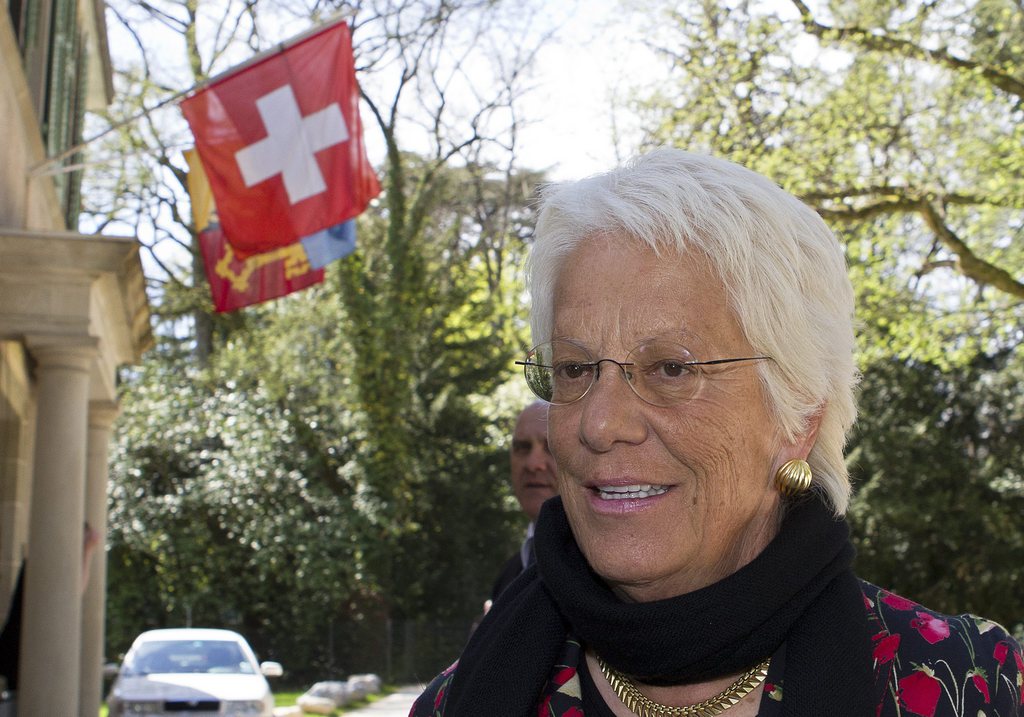Shelter for Syrian refugees in Lebanon

“Forced exile is the worst situation you can have,” says Caroline Nanzer, Swiss delegate in Lebanon of the disaster relief organisation Caritas Switzerland. She speaks from her experience working with Syrians who have fled the unrest at home.
Since the uprising against the regime of Bashar al-Assad broke out in March 2011, hundreds of thousands of people have sought refuge in neighbouring countries. The United Nations refugee agency (UNHCR) has registered 160,000 in Lebanon, although Nanzer says many do not sign up, fearing they might find their names on some sort of blacklist at home.
Despite the huge numbers, the Lebanese government has not allowed the UNHCR to set up formal camps to house them. Instead, the refugees have either rented apartments in private houses or have put up tents in so-called tented settlements on land rented from private individuals.
Caritas Switzerland, which provides emergency disaster relief and works on reconstruction and development all over the world, is cooperating with a number of partners to help these refugees. With the onset of cold weather, it is providing blankets and warm clothing, and waterproofing the tents with plastic sheeting in addition to distributing such things as basic food and medicines.
Nanzer told swissinfo.ch about the challenges they face.
swissinfo.ch: What kind of people is Caritas concentrating on?
Caroline Nanzer: We are looking after families living in informal camps. We see this kind of camp all over Lebanon, in the Bekaa valley, but also in the north. We decided to look after this kind of family because they are the most vulnerable ones, who cannot afford to pay rent.
In the Bekaa, where 60-70 per cent of the Syrian refugees are living, prices have shot up.
Caritas Switzerland is part of the international organisation Caritas Internationalis.
According to its website, its activities include the provision of emergency disaster relief.
It also “cooperates with partners …to implement reconstruction projects and promote sustainable development.”
In Switzerland it works to combat poverty and support social integration.
Abroad it supports projects in a range of countries in Africa, Asia, Europe, Latin America and the Middle East.
It is helping Syrian refugees by providing food, blankets, toiletries, clothing and medical aid.
It has distributed plastic sheeting to waterproof their tents, which are often made of simple sacking.
It also offers psychological and social counselling.
In Lebanon, Caritas Switzerland operates through its local partner, Caritas Lebanon Migrant Centre.
As an “implementing partner” it receives money from the UNHCR and other institutional donors for its work in Lebanon.
It also receives funding from Swiss Solidarity, a foundation that raises money for humanitarian relief, and which is backed by the Swiss Broadcasting Corporation.
On the ground in Lebanon it works with organisations including the Danish Refugee Council, the Norwegian Refugee Council, Handicap International, International Medical Corps and the International Committee of the Red Cross.
swissinfo.ch: Does this produce tension with the local Lebanese population?
C.N.: We should recognise that over 50 per cent of the Syrian families are sheltered by Lebanese families themselves. They have been extremely supportive.
I’ve heard many stories about how Lebanese families fled to Syria when Lebanon was attacked by Israel in 2006. So when the unrest started in Syria, many of the Syrian families who had sheltered Lebanese in 2006 went to Lebanon to be sheltered by the same families where friendships had started from the time of the war.
But regions like the Bekaa and the north where Syrians have settled are still very poor. Very recently Lebanese families have started complaining about the aid coming to the Syrians, but not reaching the Lebanese families who are themselves actually supporting these refugees. This is now creating tension, it’s true.
swissinfo.ch: Of the refugees arriving from Syria, are some opposition supporters and some government supporters? Is that a problem for you?
C.N.: As a humanitarian actor, our role is just providing support and aid to vulnerable families. Tension exists, I can’t deny it, but it doesn’t hamper our work.
All the families have fled because of abuse, because of bombing in their hometowns, and this affects all the sects. They may be rebels, or families with no political affiliation. Some refugees do not know themselves if they still want to support the regime. They are telling us that they just want to survive in Lebanon in the hope of going back to Syria.
From the many interviews I have heard it is clear that abuses are committed by both sides.
swissinfo.ch: What do they think is going to happen in the end?
C.N.: What they hope is that the unrest will stop so they can go back. Many of them, especially the Sunni, say they will not go back as long as Assad is in power.
But the unrest has definitely created a lot of tension. Many people say it has become more and more sectarian. Everyone says they hope it will get better and then they can go home.
But what actually happens – we have to wait and see.
swissinfo.ch: What are the stories that you hear?
C.N.: Something that has touched me is the women who came without their husbands and find themselves as heads of households. It’s a huge change for them in terms of gender roles. In Syrian society they had a very traditional role, being housewives and looking after the children. They are looking for work, and are discovering what it is to have an economic role in the family. I’m sure this will have an impact once they return to Syria.
We hope we will have more and more programmes focusing on women. Forced exile is the worst situation you can have, but as humanitarian actors, if we can plant some seeds among the women in this community, we will have reached a goal in developing their capacities.
The problem is that in the areas where they have settled you don’t have much employment other than in agriculture and construction, sectors where women usually don’t work.
The UN Development Programme is willing to develop programmes that will include the Lebanese host communities. For example you can train women to set up small-scale businesses, like a bakery. If you have imagination and funds you can open up opportunities.
swissinfo.ch: What about the children and their education?
C.N.: This is a huge challenge. But this is not the first time Lebanon has received a lot of refugees. A couple of years ago there were a lot of Iraqis, for instance. Programmes that were developed for Iraqis are being duplicated for Syrian refugees.
There is definitely a will on the part of the families to enrol their children for school. However, there’s a lot of fear too. For example, in the Bekaa valley there have been a lot of kidnappings. The families may not say it directly, but they are worried about sending the children out.
There are other challenges too: families are scattered all over the place, some in very remote areas. It’s difficult to bring them to school, because it costs a lot of money. The UNHCR and Unicef, for instance, have invested a lot.
And the Caritas Lebanon Migrant Centre has a programme where they are trying to bring 11,000 children into school by the end of the year. It’s definitely something we will focus on in 2013, to make sure they continue receiving education.
An estimated 700,000 refugees have fled to Jordan, Lebanon, Turkey, Egypt and Iraq, trying to escape the 21-months conflict in Syria.
More than 540,000 of them have signed up for UN assistance according to the UN Office for the Coordination of Humanitarian Affairs.
The UNHCR has registered about 160,000 of them in Lebanon.
In the past six weeks alone more than 140,000 have left Syria and crossed into neighbouring countries.
A recent UN report warns the number of Syrian refugees in neighboring countries is likely to double to 1.1 million by next June if the country’s 21-month conflict is not ended.
The UN has appealed for $1 billion (SFr0.9 billion) to fund refugee operations until June.
The Swiss-run ICRC says it has helped provide clean water for estimated ten million people since October as part of projects with the Syrian Arab Red Crescent.

In compliance with the JTI standards
More: SWI swissinfo.ch certified by the Journalism Trust Initiative


You can find an overview of ongoing debates with our journalists here. Please join us!
If you want to start a conversation about a topic raised in this article or want to report factual errors, email us at english@swissinfo.ch.